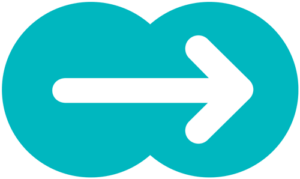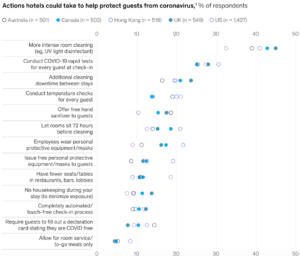As we move into the next half-year and into the 5th solid month of the hospitality industry’s challenge with COVID-19, there are some hopeful signs. With the rise in the consumer confidence index, restaurants and particularly economy hotels are seeing increased occupancy and U.S. airline passengers have peaked over 300,000 per day for the first time since March. AAA recently surveyed American tourists and found that of the ones planning to travel over the Summer holiday, 90% plan to do so within the U.S.
A Way Forward
With this growth has come a host of innovative technology to assist the industry as we tackle the unique set of challenges presented by COVID. From UV lamps and temperature monitors from big companies like AT&T to contactless interactions and a rise in anti-bacterial products from all vendors. An estimated 44% of consumers will require contactless payment options as part of a “safer experience”. Hoteliers are driving hard to find steps to reopen while meeting guest expectations and guaranteeing safety for staff and guests alike.
Cleaning Initiatives
To that effect, a number of initiatives have come up that bear consideration. McKinsey recently released a study that shows the top actions hoteliers can take to help protect guests as business opens up. The results (below) found that the most pressing concern was for better cleaning.
Clean and Clear
Organizations like AHLA have begun providing online courses and educational materials about new cleaning standards. And major brands are taking necessary steps to implement programs in their hotels like the renewed emphasis on Best Western’s I Care Clean program or Marriott’s Global Cleanliness Council. One such initiative from Marriott has been equipping hotel maintenance and housekeeping staff with odorless electrostatic sprayers with hospital-grade disinfectants for use in meeting rooms and common areas. New cleaning initiatives go beyond physical cleanliness and try to provide peace of mind by utilizing signs, decals, sanitizing stations, adjustments to the check in/out process and the like as visual cues to show guests that they care and are making the necessary changes to keep everyone safe.
With innovative solutions coming from every major brand, new branded partnerships have emerged to help hotels quickly mobilize their initiatives. Four Seasons, partnering with Johns Hopkins Medicine, has appointed hygiene officers in every hotel to act as on-site representatives with their Lead With Care program. Ecolab has partnered with Choice Hotels to deliver a similar training program across their hotels. Likewise, Hilton has established a closer relationship with Lysol and with the Mayo Clinic and Hyatt with the Global Biorisk Advisory Council. All brands are taking unique steps to put cleanliness first.
Navigating Next Steps
With AHLA’s Stay Safe Initiatives, guests might return to a somewhat foreign guest experience when they begin traveling again. MGM Resorts has engineered a contactless hotel check-in that allows guests to complete the full process on their phone, including payment and identity verification. They’ve expanded this idea to their restaurants as well and plan to offer digital menus with QR code scans and virtual queues to assign restaurant seating. A new Contactless mobile app from Assa Abloy partner, Fuel, allows guests to bypass the front desk as well, creating a digital key. This is in addition to the company’s own series of hands-free door opening solutions like the Rockwood arm and foot pulls.
Research from Niagara Universitty shows that AI and AR have a great potential to support more of a virtual customer service experience. Temperature checks and screening may be required as well as a more comprehensive and sophisticated implementation of incident reports and response. Trax Analytics has developed a real-time alerting system to show housekeeping staff when an area falls below health standards. Health is becoming not only a part of the guest experience, but also a growing risk of liability for hoteliers. This is why companies like Knowland have stepped up to offer a kind of “to-do list” with the help of predictive analytics to show hoteliers where they are and where they need to be in order to be ready to rebound from this crisis.
Conclusion
We know that great crises often inspire faster development and great leaps in evolution of human habits and in technology. The great news is that there is a path forward. As devastating as the COVID-19 epidemic has been, it has revealed some great areas of growth, as we listen and learn, we can rise to the occasion, offer a greater and safer guest and staff experience and inspire stronger loyalty and investment from our communities.



